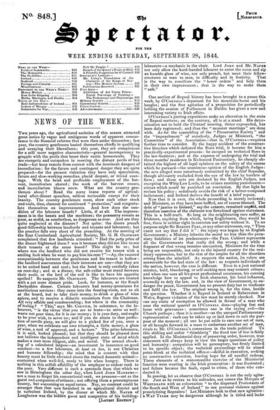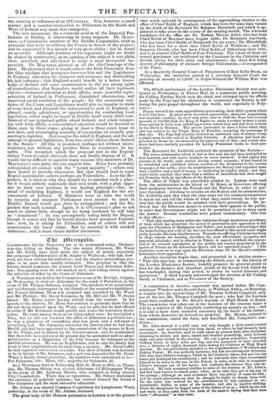One section of Repeal history has been brought to a
pause this week, by O'CoNNELL's departure for his mountain-home and his One section of Repeal history has been brought to a pause this week, by O'CoNNELL's departure for his mountain-home and his beagles; and the first agitation of a proposition for periodically holding the session of Parliament in Dublin has given a new and interesting variety to Irish affairs. O'Coississis parting expositions make no alteration in the state of Repeal matters; on the contrary, all is at a stand. His deter- mination not to hold the Clontarf meeting, thrice expounded, has been duly registered; and thus the "monster meetings" are done with. As for the assembling of the "Preservative Society" and the "impeachment" of somebody, Judges or Ministers, "the Committee" of the Association—that is, O'Corutsm.—requires further time to consider. By the happy accident of the construc-
tive blunders which defeated the State trial, it became for him a practically-experimental process : he escaped on technical flaws in
the law-business ; and at the expense of undergoing the trial and three months' residence in Richmond Penitentiary, he cheaply ob- tained the highest of all legal opinions on the safety of the course
which he pursued—the unanimous opinion of the English Judges : the acts alleged were notoriously committed by the chief Repealer, though ultimately excluded from the eye of the law by barriers of form ; and those acts are declared by the English Judges, not excepting the Whig Law Lords, to be crimes meriting punishment— crimes which would be punished on conviction. By that light he revises his policy ; sedulously avoids the risk of a better-composed indictment ; and Ireland derives the benefit of a brief repose.
Now that it is over, the whole proceeding is sternly reviewed; and Ministers, as they have been baffled, are of course blamed. The debt of "justice to Ireland," say the censors, remained unplfid, and therefore coercion of the claimant was foreclosed against statesmen. This is a half-truth. So long as the neighbouring race suffer, as Irishmen, anything from which, being Englishmen, they would be free, there is neither right in coercion nor safety without it. To no purpose might Sir ROBERT PEEL, or any other statesman, cry," Thou
canst not say that I did it " : the injury was begun by an English
Government ; a Ministry inherits the moral no less than the pecu- niary liabilities of its predecessors—the PEEL Cabinet represents all the Governments that really did the wrong ; and while a fragment of that wrong remains unrepaired, Ministers for the time being are responsible, not only to the injured country for the resi- duary oppression, but to the rest of the empire for all the disorders arising from the mischief. As respects the nation, its rulers are answerable for the bad state of the law : as respects individuals of the nation, however, the case is different. Even in a just national mission, bold, blundering, or self-seeking men may commit crimes; and when one uses all his great professional astuteness, his cunning knowledge how to appeal to Irish character, his local influence, avowedly to defy the law, and, in the view of Government, to en- danger the peace, Government has no present duty but to vindicate and fulfil the law. The original wrong is, for the time, beside the question. Whether it is Repeal in Ireland or Rebeccaism in Wales, flagrant violation of the law must be sternly checked. Nor
can any claim of exemption be allowed in favour of a man who uses the national quarrel as O'CONNELL does—playing fast and loose with grievances : sometimes one is the crying evil—the Church perhaps ; then it is another—as the unequal Parliamentary representation : each can be taken up or laid down to suit the pur- pose of the moment ; all can be put aside to ease one set of men, or all brought forward in a mass to embarrass another set of men, rivals to Mr. O'CoNNELL's connexions in the trade political To this shifting and unfair " thimblerig" the fixed test of law is fairly applied. In the Ministerial duty of preserving order, however, true statesmen will always keep in view the larger questions of policy and humanity : compulsion will be peremptory, but firmly limited to its specific object ; the technical proceedings will be aimed point-blank at the technical offence—skilful in execution, seeking no constructive extension, leaving hope for all needful redress. These elements of a statesmanlike exercise of the Ministerial function were wanting in the Irish prosecution : it was frustrated ; and failure became the fault, equal to crime, of those who con- ducted it.
In passing, let us observe that O'CoinsELL is not the only agita- tor. Just as he retires to his solitudes, out comes the Marquis of WESTMEATH with an exhortation "to the dispersed Protestants of the South and West of Ireland" to use personal violence against proselytizing Repealers ! Let Ministers look to that new agitation : a WAN TYLER may be dangerous although he is titled and lacks
the cunning or influence of an O'CONNELL. It is, however, a small matter, and a counter-instruction to Policemen in the South and West of Ireland may meet that emergency. The new movement, for a triennial session of the Imperial Par- liament in Dublin, is interesting in many respects. Dr. MAUN- SELL, a Conservative member of the Dublin Corporation, tried to persuade that body to address the Crown in favour of the project ; and he supported it in a speech of very great ability : but he found no seconder. Although portions of his argument might no doubt be shaken by controversy, as an opening of the subject it was plain, clear, practical, and calculated to make a most favourable im- pression. Dr. MAUNSELL glanced at all the chief bearings of the plan. He promised that it would relieve the Irish Protestant from the false medium that interposes between him and the Legislature in England, distorting his character and purposes and diminishing his just influence; that England would benefit by a better know- ledge of Ireland and some counteraction to the too strong spirit of centralization ; that Repealers would realize all their legitimate objects—increased attention to Irish affairs, more powerful repre- sentation of Ireland in Parliament, diminished absenteeism, and improved social condition of the people : for the occasional resi- dence of the Court and Legislature would give an impulse to trade of every kind, and diminish the inducement to seek in England, or abroad, courtly splendours, or opportunities for conducting local legislation, which might be found in Dublin itself every third year. Instead of our perpetual gabble about Ireland, and crude tamper- ing with Irish affairs, a concentrated attention would be devoted to them once in three years ; giving at least a three-years lease to new laws, and encouraging maturity of conception on actually pro- ceeding to legislate. And imagine the relief to England, and the ad- vantage to general legislation, from two years' silence about Ireland in the Senate ! All this is promised, perhaps not without incon- veniences, but without any positive harm to counteract its be- nefits. The reception which the proposal met in the Repeal- ridden Town-Council obviously does not finally dispose of it. It would not be difficult to surmise many reasons why members of Dr. MAUNSELL'S own party did not support him. Some have probably relinquished all contest with the "tyrant majority " ; others may have feared to provoke discussion, lest that should lead to some Repeal amendment ; others perhaps are Federalists. As to the Re- peelers, it is obvious why they should try to smother such a plan : for it would entirely supersede their own trade, with a plan oppo- site to their own nostrum in one leading principle—that, in- stead of excluding England, it would use England for the ad- vancement of Ireland. If Ministers were to take the world by surprise and summon Parliament next session to meet in Dublin, Repeal would ipso facto be extinguished ; and the Re- pealers fear such a result. Again, it is O'CONNELL'S plan to ask much to obtain little, though on its being tendered he will take an " instalment " : he was peremptorily asking lately for Repeal, though it comes out that he would always have accepted Federal- ism : now, he is asking for Federalism, and of course will not countenance the lower claim. But he received it with marked deference ; and it must obtain further discussion.



























